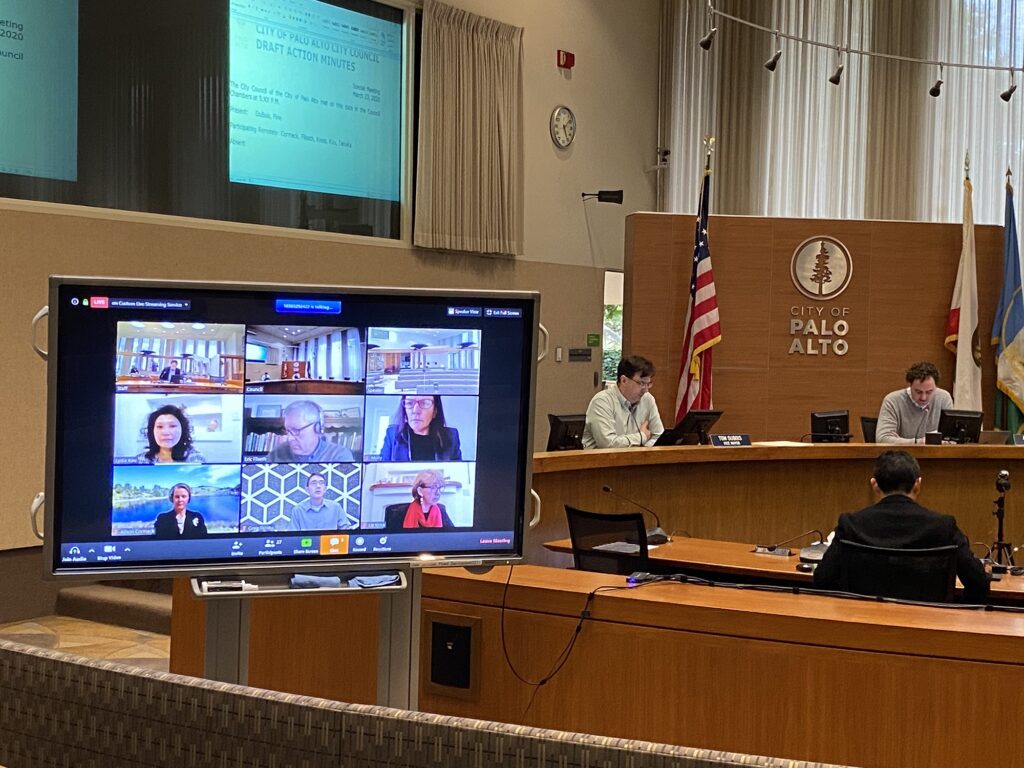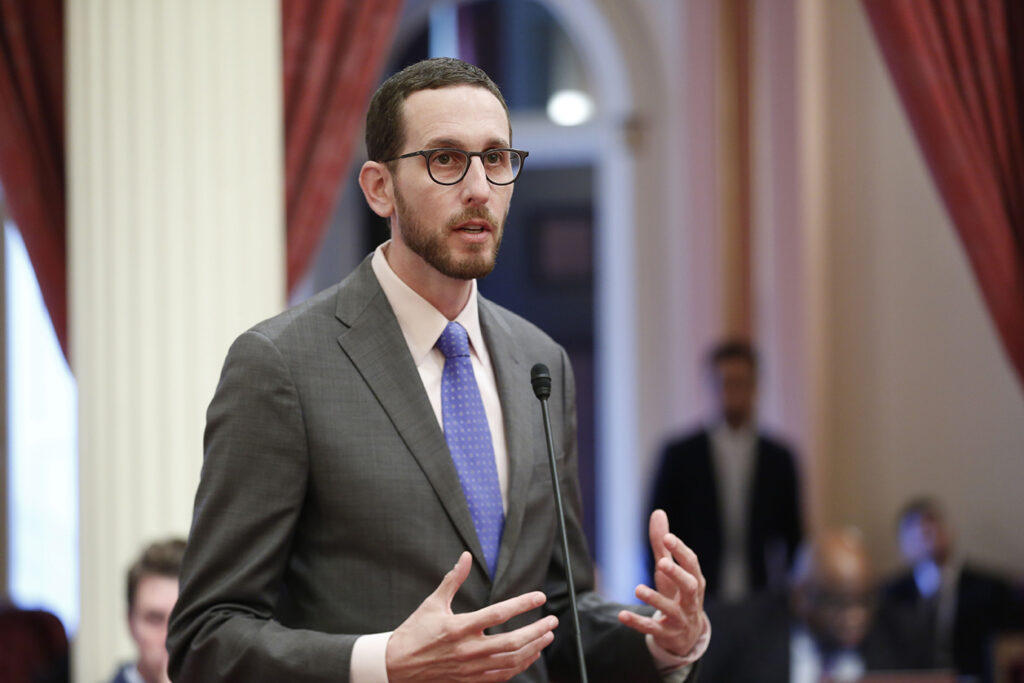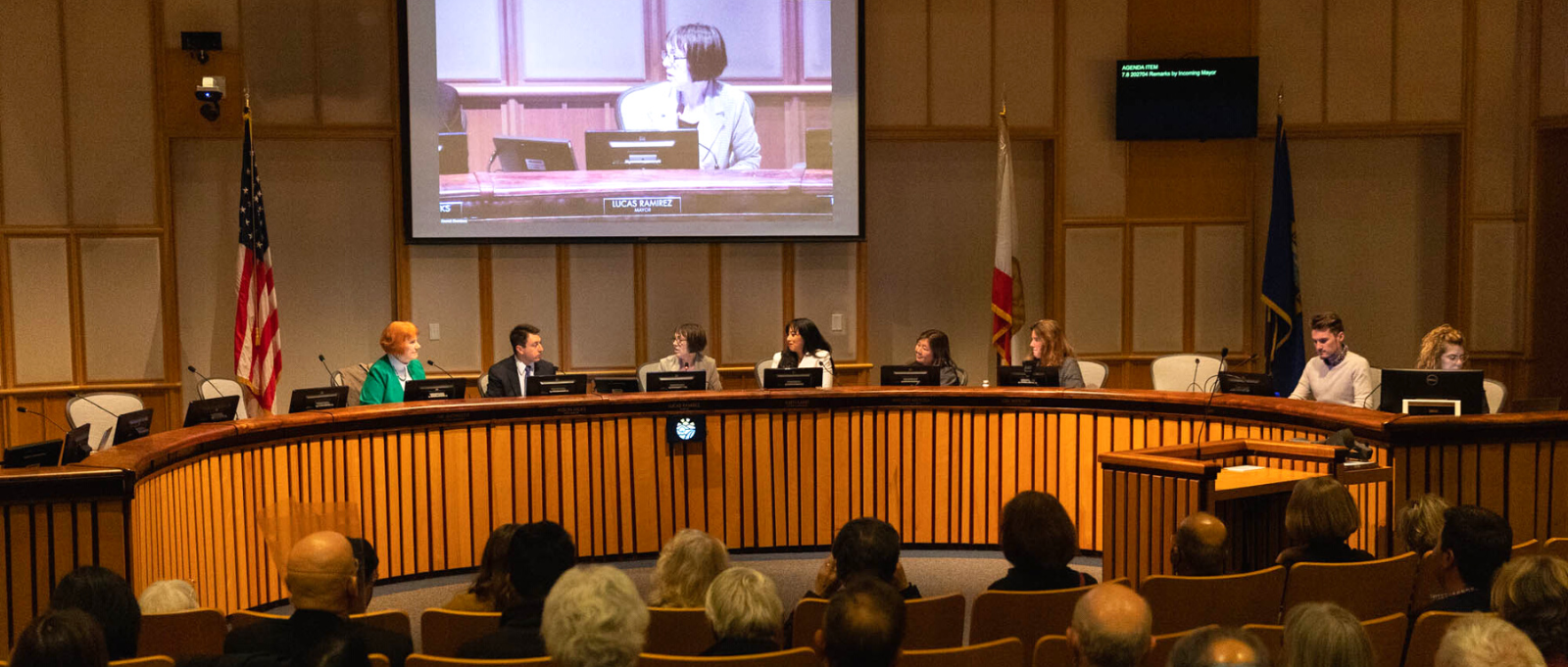April 27, 2023
In this legislative session, with a record-breaking number of bills being introduced, CivicWell is taking supportive stances on a number of important bills. In addition to climate (SB 511 Blakespear), housing (AB 930 Friedman), and transportation (AB 6 and AB 7 Friedman) legislation, CivicWell is supporting two bills related to public meetings.
The Brown Act, which governs procedures for open meetings for local government bodies, generally requires that such meetings be held in-person with both the members of the body and the public in attendance. During the course of the pandemic, the in-person requirement was modified to permit virtual meetings. That allowance is set to expire on January 1, 2024. The following bills have been introduced to extend and expand upon the benefits of the modification:
- AB 557 by Assemblymember Gregg Hart would delete the sunset of January 1, 2024 for holding meetings of city councils and boards of supervisors by teleconference. AB 557 passed out of the Assembly Local Government Committee on April 26 and heads next to the Assembly floor.
- AB 817 by Assemblymember Blanca Pacheco would expand the option to use teleconferencing—indefinitely and without regard to a state of emergency—for meetings of local government advisory boards, commissions, and committees. A number of press organizations raised opposition to AB 817 and negotiations are underway to try to resolve the differences. The bill will likely be heard on Wednesday, May 3.
There is also a third bill, SB 411 by Senator Anthony Portantino, which as originally written would have deleted the sunset of January 1, 2024 for holding teleconference meetings and expanded the ability to have teleconference meetings to advisory boards, committees, and commissions of local governments. As of last week, it was amended in the Senate Governance and Finance Committee to be limited to Neighborhood Councils in the City of Los Angeles and to have a new sunset date added. Although we are still in support of this bill, it will have a much smaller impact with this amendment.
CivicWell supports the continuation of virtual and hybrid public meetings because of the advantages for sustainability, access, and equity.

Environmental and Health Benefits of Virtual Meetings
A recent document from the Sacramento Metropolitan Air Quality Management District explored the benefits to air quality during the period of regional shelter-in-place restrictions. According to the report:
“Cars, trucks, buses, locomotives, construction equipment and other vehicles that make up the transportation sector are the largest source of air and climate pollution emissions…While shelter-in-place restrictions were in effect (March 2020 – July 2020), there was 28% less particulate matter pollution (PM2.5), 13% less nitrogen dioxide (NO2) pollution, and 10% less ground-level ozone (O3) pollution.
For the same period, the Sacramento Area Council of Governments (SACOG) observed that daily vehicle miles traveled (VMT) in the six-county SACOG region dropped to approximately half the driving relative to pre-pandemic levels, with the sharpest drop occurring in April 2020 when VMT in the region was 74% lower than pre-pandemic levels.”
Air Quality Benefits of Teleworking and Teleconferencing
Virtual meetings contribute to a reduction in vehicle miles traveled (VMT) and carbon emissions. In-person meetings of 50 people have an average total of 62,645 pounds of carbon emissions, which is reduced to 385 pounds for virtual and hybrid meetings.
Additionally, the reduction in exposure to infectious pathogens is well documented and the primary reason for teleconferencing during the pandemic. According to a recent report by the California Commission on the Status of Women and Girls, “it is estimated that between 12.9 and 14.9% of all adults living in the state have experienced symptoms consistent with Long COVID…with women facing an elevated risk of Long COVID and more significant impacts to their workforce participation, long term economic health, and ability to build wealth over time.”
Benefits of Open Meetings for Accessibility and Equity
The option of virtual public meetings allows for broader participation in civic life due to reducing barriers such as childcare and the time and cost of transportation. Supporting access for all residents to make their voices heard is a crucial step toward increasing racial, gender, and disability equity in local government.
In a Los Angeles Times article from 2021, legal director of the American Civil Liberties Union of San Diego and Imperial counties David Loy was quoted:
“Single parents, disabled residents, homebound seniors and others were able, perhaps for the first time, to hear and see in real time the decisions being made by their elected officials…Public policy and state law should do everything possible to encourage, support and facilitate active and engaged civic participation through attendance at public meetings.”
The ACLU of Massachusetts and Common Cause concurred in a joint statement: “Remote and hybrid meetings significantly and equitably increase public participation in local government.”
According to the Centers for Disease Control and Prevention, one in four Americans lives with a disability that limits major life activities. The increase in remote work options over the last few years has led to record employment for people with disabilities, and open public meetings similarly increase participation.
The Institute for Local Government notes that, “for people whose disabilities or chronic condition(s) feature fluctuating energy levels, pain, and/or fatigue, attending public events or lengthy meetings can be difficult, and may even impact their health adversely. Phone-in lines or video conferencing sessions can allow people with these impairments to attend meetings, events or public forums remotely.”
And in a recent Boston Globe article, Google software engineer Dianna Hu who uses a powered wheelchair, “compared the availability of remote technology to curb cuts, elevators, and other upgrades intended to improve access to public spaces.”
For both in-person and virtual formats, there are several steps local governments can take to ensure that their public meetings are accessible for people with disabilities. Here are a few simple actions:
- Ensure that the sound is clear, adjustable by volume, and as free of static as possible.
- Presentation documents such as PowerPoint, Word, and PDF should, when possible, be distributed ahead of the meeting to allow attendees to pre-read or reference at their own pace.
- Sans serif fonts should be used, as this type of font tends to be easier to read.
- Use a minimum font size of 24 points for PowerPoint presentations.
- For attendees who are deaf or hard-of-hearing, materials that include an audio component should have an accompanying text version (e.g. open or closed captioning).
- Invite an ASL interpreter and have that person on video along with the elected officials.
- Video Remote Interpreters (VRI) and Communication Access Real-Time Translation (CART) are two third-party services that can provide ASL interpreting and captioning options.
Resources:
- Increasing Access to Public Meetings and Events for People with Disabilities, Institute for Local Government
- Virtual Engagement Tools and Best Practices, CivicWell
- Constructing Accessible Online Content, CA Department of Rehabilitation
- Seven Steps to Creating an Accessible PowerPoint Presentation, CA Department of Rehabilitation
- Accessibility for All: ADA Considerations for Public Meetings, Granicus
- Create Accessible Meetings, Section508.gov
- ADA Best Practices Tool Kit for State and Local Governments

Policy Corner
Legislators Continue Efforts to Address Housing Shortage
Housing production in California remains well below the levels needed to significantly boost supply, improve affordability, and help prevent homelessness. By current estimates, the state faces a shortage of at least 2.5 million units of housing. Yet, in recent years, only about 100,000 units have annually received permits to build. The Department of Housing and Community Development (HCD) has said that at least 200,000 units need to be permitted each year in order to meet the projected need.
Even after several years of approving scores of bills designed to reduce the procedural barriers and accelerate the approval of housing proposals, this year the Legislature has generated dozens more bills addressing these issues. Perhaps the most prominent and contentious of these bills is SB 423 by Senator Scott Wiener. The bill would extend and modify a previous bill by Senator Wiener, SB 35 in 2017, that streamlined the approval process for certain projects that included affordable units.
SB 35, which is due to sunset on January 1, 2026, provides that projects which include at least a required number of affordable units and satisfy other specified criteria qualify for a streamlined, ministerial review and approval process by local governments. In addition, qualifying projects are also exempt from the California Environmental Quality Act (CEQA).
It is estimated that between 2018 and 2021, nearly 20,000 units of housing, 60% of which have been lower income affordable units, have been approved using the SB 35 process. In addition, projects receiving their approval using SB 35 have reduced the entitlement processing time by one-half to three-quarters. However, while the results have been notable, the production of affordable units has still trailed the proportionate approval of market rate units.
SB 423 proposes to make a number of changes to expand and build on the success of SB 35. First, the bill would eliminate the sunset date of January 1, 2026. Two other significant expansions under SB 423 would be to apply the streamlined, ministerial approval process to local governments within the coastal zone and to local governments that do not have a timely approved housing element by HCD for the entire period during which that element would be applicable. The bill would also modify the required labor standards by incorporating the same standards included in AB 2011 from last year. Additionally, the bill would clarify certain requirements to ensure that projects could not be delayed or rejected by the misapplication of non-objective local standards.
While numerous organizations and unions that support increased housing production, affordable housing, and the revised labor standards have rallied to support the bill, intense opposition has come from a host of local governments and some building trades unions. The local governments object to what they believe is an unwarranted intrusion on local control, while the building trades unions decry changes to the labor standards embedded in SB 35. As a consequence, SB 423 presents an extremely difficult choice for many legislators. As of April 26, SB 423 has passed the Senate Governance and Finance Committee and is headed to the Senate Appropriations Committee.
With the average price of a home in California still exceeding $800,000 and the extreme shortage of affordable units manifest in nearly every community, CivicWell continues to advocate for measures at the state level that are designed to foster sustainable communities and meet the fundamental need for shelter for all. SB 423 strikes an appropriate balance by allowing local governments to apply objective standards to housing proposals, ensuring high quality projects that are both an aesthetic and functional asset while fostering economic integration and accelerating the approval of badly-needed affordable housing.
Board Highlight
Yasmine-Imani McMorrin Featured in Essence
Culver City Councilmember and CivicWell Board Member Yasmine-Imani McMorrin was recently interviewed by Essence on what made her want to run for office, how she maintains work-life balance, and her vision for Culver City.
“A true renaissance woman, in addition to her Council duties, McMorrin also works for California’s Children’s Defense Fund serving as Director of Education Equity. Trained as an attorney, McMorrin is proud to be a mom to her daughter, and her ‘vision as a Council Member is to ensure that as Culver City develops, we prioritize equity, making sure that everyone shares in the progress we create together.’”
Header photo: Mayor Alison Hicks speaks during a Mountain View City Council meeting on Jan. 10, 2023. Photo by Magali Gauthier.






